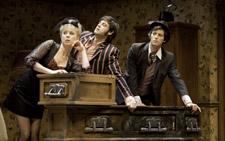I saw Albert Schultz working out recently, and I feel it’s my duty to report that Soulpepper Theatre’s hunky artistic director is sporting some seriously killer calves for summer. Now that we’ve gotten that out of the way, let’s talk about Schultz and company’s upcoming production of Loot, a classic farce by British playwright Joe Orton.
Orton wrote the play back in 1964 as a scathing satire of the Catholic Church and London’s police force, both of whom he felt wallowed in an excess of hypocrisy and corruption. “Joe was searching for his voice at the time,” says Loot director Jim Warren. “He had a lot of anger and was looking for a form he could use to offend certain social mores while still getting people to laugh.”
Inspired by writers like Oscar Wilde and George Bernard Shaw, Orton drew on dark farce to get his controversial points across. “He realized it was a great weapon to attack with,” Warren says. “Yes, it was funny, but it was also razor sharp and the stakes were very high.”
Perhaps a little too high. Loot’s first production was widely panned by both sniffy critics and pissed-off audiences. Sure, Orton wanted to offend folks, but his long-winded fourth play wasn’t hitting the right balance of delighted shock and moral outrage. Going back to the drawing board, the playwright snipped 600 words or so and tightened up the story, one that is still timely — if perhaps not quite as shocking — 49 years on.
As with most farce the plot is pretty straightforward. Hal (played by Matthew Edison) is a disaffected youth still living at home, trying unsuccessfully to embark on a glamorous life of crime. His mother dies, but rather than wallow in despair with his grieving father (Oliver Dennis) the crafty lad begins to hatch a macabre plan: Turns out that mummy’s cadaver is resting in a funeral home next to the local bank — a perfect target for an enterprising young thief. Hal and his pal Dennis (Jonathan Watton) actually manage to pull off the heist, but where to hide their illicit booty? Hopefully a bumbling undercover detective (Michael Hanrahan) will discover all before the smell becomes too much to bear.
“It was something that audiences hadn’t really seen in England at the time,” says Warren, “these fantastical situations that Joe put his characters and his voice into. It was gritty and rant-like with real anger and protest underneath.”
This stark departure from twee dramas and polite comedies reflected Orton’s frustration with the way audiences at the time wanted to see things, as opposed to the way things actually were.
“He grew up in an English working-class town called Leicester, with the idea that the police are good and that if you go to church regularly everything will turn out okay,” Warren says, “and of course, in Orton’s world, it doesn’t.
“He had no compunction about his notable promiscuity in the underground gay sex scene, but at that time his lifestyle was illegal and the police were constantly harassing his world.
“Society was in denial and didn’t want to believe that any of those things didn’t exist. He wanted to put it all out in the open.”
If plot turns involving serial killer nurses and corrupt investigating police raised some eyebrows back in the day, imagine a 1960s audience reaction to the two boys’ talk of brothel sex with Pakistani boys and midgets. Warren confesses to hoping for some sharp intakes of breath among the more easily provoked members of the contemporary audience. “I’d feel I was failing Joe if there weren’t any,” he laughs.
The director’s affection for both Orton the man and Orton the playwright dates back to Warren’s theatre school days. “I found him so fascinating and different,” he says. “I’d always been a fan of comedy with a point of view, and comedians like Ricky Gervais, Nigel Hawthorne or John Cleese who use anger in their humour.”
Reading Orton’s biography only intensified Warren’s appreciation for the playwright’s subtle weaving of politics and entertainment into something that felt genuine and unforced.
“I have great affection for his wanting to protest through theatre, using comedy that isn’t lecture-driven,” Warren says. “I don’t want to feel like I’m having a finger waved at me.
“It wasn’t as if he was condoning that people go out and loot or murder anyone, but better off to be a criminal than a dishonest socially correct sort of person.”

 Why you can trust Xtra
Why you can trust Xtra


